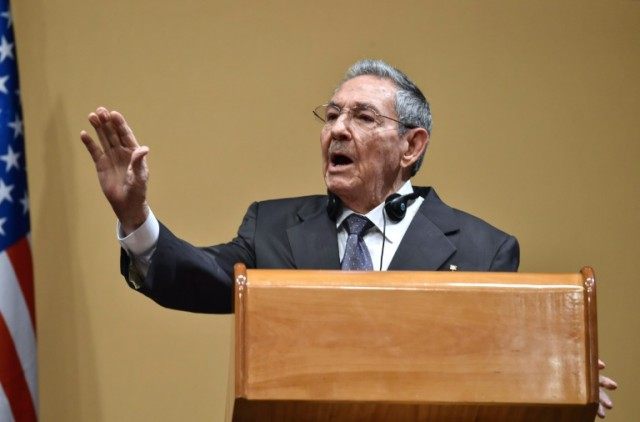Cuban dictator Raúl Castro called for “respectful” dialogue with the new Trump administration in Washington, which would require the White House to abandon any attempts at getting the Castro regime to “enact concessions” on human rights.
Speaking before a summit of the Community of Caribbean and Latin American States (CELAC), Castro asserted that his nation would continue to be “sovereign, independent, socialist, prosperous, and sustainable,” and would “continue dedicated to the actualization of our social and economic model.”
Speaking to President Donald Trump directly, Castro said that he wished “to express Cuba’s will to continue negotiating bilateral matters pending with the United States on the basis of equality, reciprocity, and respect for the sovereignty and independence of our nation.”
“[We] wish to… continue the respectful dialogue and cooperation on matters of common interest with the new government of President Donald Trump,” Castro told listeners at the event. In order of this dialogue to continue “in a civilized manner,” he warned, “no one can expect that Cuba make concessions inherent to its sovereignty and independence.” Castro expressed “concern” that Trump had “made declarations that put at risk” the interests of countries in the region, without elaborating on what those declarations were.
Paramount among them must be, however, Trump’s repeated calls to use American diplomacy to force the Cuban Communist Party to adhere to international human rights standards on prisoners of conscience and religious freedom. Trump has been strongly critical of his predecessor Barack Obama for yielding to a number of Cuban government concessions – including removing the Hezbollah-tied government from the U.S. state sponsors of terrorism list – and has promised to reverse the trend.
Following President Obama’s announcement of “normalization” of relations with Castro, the Cuban government increased its rate of arbitrary arrests of political dissidents and cracked down on Christian communities not directly controlled by Havana. An NGO that keeps a tally of such politically-motivated arrests found in December that Cuba would surpass 10,000 arrests in 2016, a new recent record. Among those arrested were Cubans who publicly expressed support for President Obama.
“The President’s one-sided deal for Cuba benefits only the Castro Regime,” Trump said at a campaign event in September 2016. “All of the concessions that Barack Obama has granted the Castro Regime were done through executive order, which means the next President can reverse them, and that is what I will do unless the Castro Regime meets our demands.” Trump made explicit that “religious and political freedom for the Cuban people” would be on that list of demands.
Following his electoral victory, Trump reiterated his stance on Cuba. “If Cuba is unwilling to make a better deal for the Cuban people, the Cuban/American people and the U.S. as a whole, I will terminate deal,” he wrote on Twitter in November, following the death of Fidel Castro. Trump issued a statement calling the late Castro a “brutal dictator” following his death, recalling his record of “firing squads, theft, unimaginable suffering, poverty and the denial of fundamental human rights.”
These positions are consistent with public statements Trump has made for decades. In 1999, for example, Trump wrote an opinion piece for the Miami Herald in which he explained why he had not conducted business in Cuba, despite the potential for opening a successful hotel there. “I had a choice to make: huge profits or human rights. For me, it was a no-brainer,” he wrote.
Raúl Castro has remained largely silent on Trump following his ascent to power. The Cuban government congratulated Trump on his victory in November, and Castro made his first extended statements on the matter in the CELAC meeting this week. CELAC is often a safe venue for the Cuban communist dictatorship, as well as its proxy government in Venezuela. It is the venue where Castro chose to demand President Obama “return” Guantánamo Bay to Cuba (the Cuban government has never had sovereignty over Guantánamo, as American soldiers have been present there since before its independence in 1902). “It would not be ethical, just, nor acceptable to ask of Cuba anything in return,” Castro said at the same summit in 2015.
CELAC is also the same venue where Venezuelan dictator Nicolás Maduro claimed Costa Rican diplomats exposed former vice president Joe Biden’s plan to overthrow him in 2015.

COMMENTS
Please let us know if you're having issues with commenting.